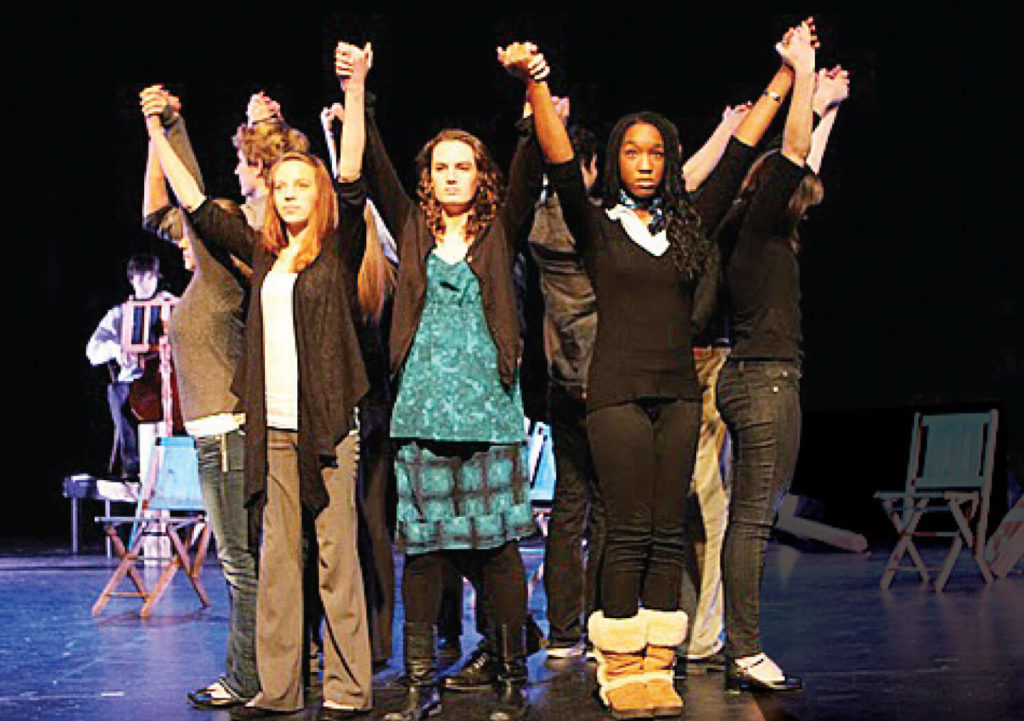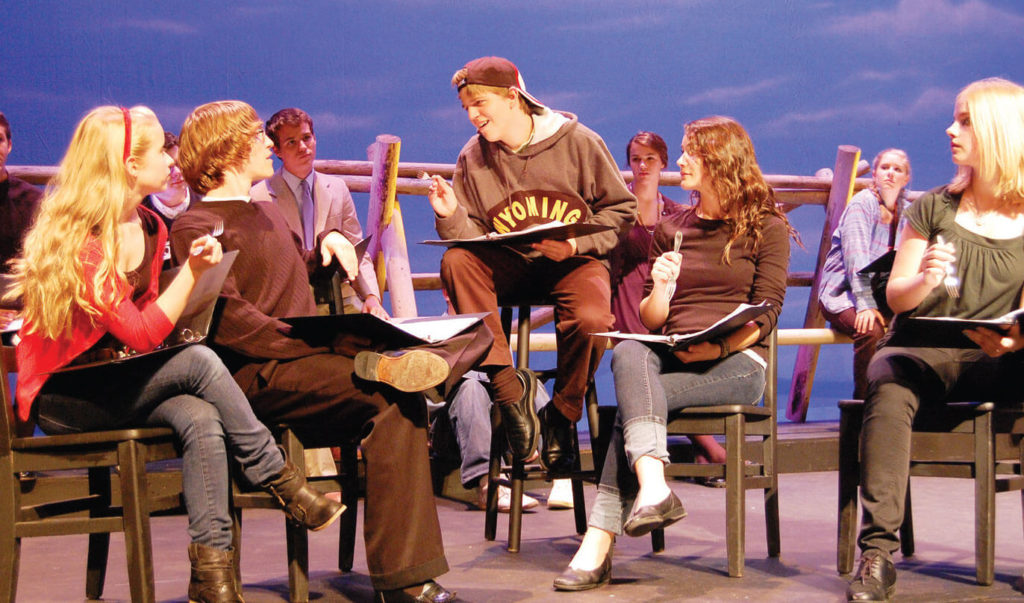by Joan Mitchell, CSJ
ON OCTOBER 6, 1998 a biker found Matthew Shepard, 21, beaten, bloodied, and left for dead out on the Wyoming prairie. This gay college student had lain tied to a wooden fence for 18 hours. He never regained consciousness and died October 12, 1998, surrounded by his family.
ON OCTOBER 8 Russell Henderson and Aaron McKinney were arrested for the crime. On April 5, 1999, Henderson pleaded guilty to felony murder and received two consecutive life sentences. On November 5, 1999, McKinney was convicted of first-degree felony murder and second-degree murder and sentenced to two consecutive life sentences.
IN NOVEMBER, 1998, five members of New York City’s Tectonic Theatre group went to Laramie to research how residents felt and thought about this hate crime. The play, The Laramie Project by Moises Kaufmann, grew out of 200 interviews and six trips to Laramie.
IN 2008, members of Tectonic Theater Project returned to Laramie to find out what has happened over the last 10 years.
ON OCTOBER 12, 2009, the 11th anniversary of Matthew’s death, The Laramie Project Epilogue premiered in 100 cities across the country, performed simultaneously by high schools, universities, and professional regional theaters.

The Duluth Central High School students who performed The Laramie Project as their school play in Duluth, Minnesota, insist Matthew Shepard did not die alone. The play documents family and townspeople’s responses to Matthew’s beating and death. In performing this play the students tell his story and recognize art can help end hate.
“Matthew Shepard can give us hope,” says drama teacher Liz Larson. “This play about hate can give us hope. The word heart contains the word art. Art takes us to the heart, to one another’s hearts.”
“We’ve seen bullying over the internet increase significantly since The Laramie Project first came out,” says Kent Knutson, director of the Minnetonka, Minnesota, High School production, citing recent news stories about young people committing suicide after internet bullying. “We wanted to do this play to help celebrate our differences, instead of fear them.”
What did the student actors learn in performing this play? “Whether you agree or disagree about homosexuality, you have to respect people,” said Julie Trudeau. “No one has the right to hurt anybody else — ever.” Julie performed three roles in the play — Alison Mears (girlfriend of one of the boys who beat Matthew), a news reporter, and a grandmother from the town.
“Homosexuality and bullying are hard subjects to talk about, especially in high school,” said Ryan McCartan, who played Matthew’s father, Dennis. “Some people just blew the play off, and that’s okay because we didn’t expect to take all 700 audience members with us on the journey. But we took at least one, and that’s a start. The play is a catalyst for change.”
“Last night and tonight it hit me how big an effect just one story can have,” says Anne Harala, who played a news reporter and the foreperson of the jury. “Hearing people in the audience cry, I realized the play has a domino effect.”

“In high school you can get trapped, all wrapped up in your high school stuff and not see that hate occurs, not see the hatred people have for those who are slightly different,” adds De’Lon. “What we’re doing with the play is sending a message of hope — that a hate crime like this won’t happen again. We’re giving people the message that maybe Matthew died for a reason. He didn’t die alone.”
Do high school kids have problems accepting gays? “Our school has a lot of antigay rhetoric, a lot of hatred. When kids see this play, it gives them a chance to really think about what’s going on,” Central student director Jan Tilley says.
“This morning in metalworking this guy told our teacher he didn’t want to go to a play about a touchy subject,” says Jeff Schmitz, agreeing. “She said he could go to the library. Then she got into this deep discussion about how we shouldn’t shy away from controversial things. We need to face up to life. People are gay. They are not evil people. They’re people.” Jeff played a reporter and doctor.
“I think the show raises the idea that we are all human, all similar in universal ways,” says Katherine Fried. “You may be gay but you are still a human. That sounds funny but it’s important to remember. Being gay is only one aspect of a person, and if you don’t agree with that it’s okay, but he or she is a person just like you. He or she has relationships, a life, and it’s really important to respect that.”
“The students of this generation see that the gay community is getting stronger and growing,” says Jacob Fazzio, who played the president of the University. “But this play is not about being gay. It’s about the reactions that the community had to the problem, and the problem was the lack of respect.”
Andy Olson liked the Catholic priest’s observation. “The priest is saying the attackers did violence to Matthew, but anti-gay rhetoric is also violence — the seed of violence. It brings home all the antigay rhetoric that we hear in high school. I wonder if Aaron McKinney’s teachers heard anti-gay rhetoric from him, if they could have changed what happened. What if they said, quit calling kids fags. It’s not okay to scapegoat gays and lesbians.”
“The Church teaches that we must respect gays and lesbians. They have the same dignity every human being has. The Church doesn’t accept sexual relationships between gays and between lesbians, but it’s not wrong to be gay,” explains Sister Joan to the group.
“Playing the part of Jedediah helped me,” says Darren Hall. “He was basically me six months ago. I was raised as a Christian Pentecostal to think that homosexuality is wrong. I asked why? Why is because the Bible says this. Then I saw the gossip and back-stabbing that goes on in the church. I started to think how can you persecute so many people and gossip yourselves? God did not put us on this earth to judge other people. We need to love.” Besides Jedediah Schultz and a Baptist minister, Darren played Aaron McKinney.
As De’Lon Grant delivered Dennis Shepard’s speech against the death penalty at the sentencing of the young man who killed his son, listeners were crying throughout the auditorium.
Matt officially died in a hospital in Ft. Collins, Colorado. He actually died on the outskirts of Laramie, tied to a fence. You, Mr. McKinney, with your friend Mr. Henderson left him out there by himself, but he wasn’t alone. There were his lifelong friends with him, friends that he had grown up with.
You’re probably wondering who these friends were. First he had the beautiful night sky and the same stars and moon that we used to see through a telescope. Then he had the daylight and the sun to shine on him. And through it all he was breathing in the scent of the pine trees from the snowy range. He heard the wind, the ever present Wyoming wind, for the last time. He had one more friend with him; he had God. And I feel better knowing he wasn’t alone.
I miss my son, but I am proud to be able to say that he is my son. I would like nothing better than to see you dead, Mr. McKinney. However, this is the time to begin the healing process. To show mercy to someone who refused to show any mercy.
